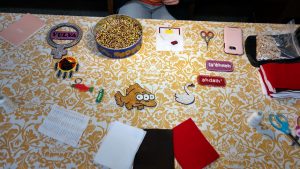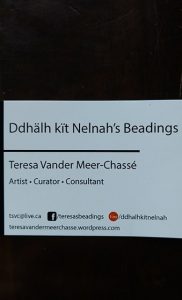Today in Art Class we had a talk from Indigenous Artist in Residence Teresa Vander Meer-Chasse who talked to us about her artistic process, heritage, and view on sharing Indigenous funds of knowledge regarding art.
Some of the people in our cohort had the privilege of taking a beading workshop with her at the BC Museum. I have been interested in beading for a long time but there is a lack of books on the subject. It was interesting to learn that in her culture, teachers/masters don’t “teach” in the same sense that teachers do in the BC Curriculum; as a student you watch the master and ask questions (there are no pre-made up worksheets, etc).
I kind of liked the idea of putting all the beads in the same tin with the intention that it teaches the student about patience – you must pick the colour of beads you want, one by one. A lot of Teresa’s art was influenced by her grandfather who she grew up and loves a lot (she does a lot of beadwork on automotive parts).
In the below picture the pink name tag means woman in Teresa’s mother tongue and the red pink tag means blood in her mother tongue. The Indigenous looking logo is the logo of her community and the female vulva beaded piece is being gifted to go on a puberty hood.

Teresa is from an extremely small community on the border of Alaska and the Yukon (I believe she said there was 50 people in her community). It was interesting to learn that her community was the very last one in Canada to “come out of the bush” and live within settled Canadian communities in the 1970s.

Teresa also told her about what is appropriate to share in her community in regards to art and what is not. So everything that is related to potlatch she does not sell or gift to non-family members – so moccassins, puberty hoods, etc. She is keen to teach people about beading techniques but not Indigenous patterns – these are part of her heritage and her community.
Teresa is interested about the power dynamics between self taught learners (like herself and many other Indigenous artists) and those learners who have been in formal institutions (like Emily Carr, and ‘formal’ artist residences). And how certain knowledge is privileged over others, and just how its difficult for herself to talk to other artists at times because they speak in so much jargon.
Hopefully she does another workshop soon!